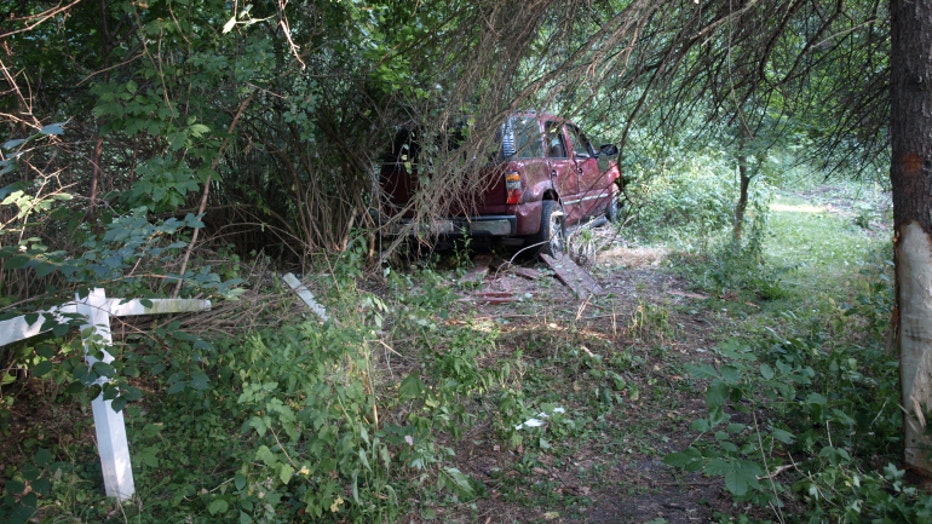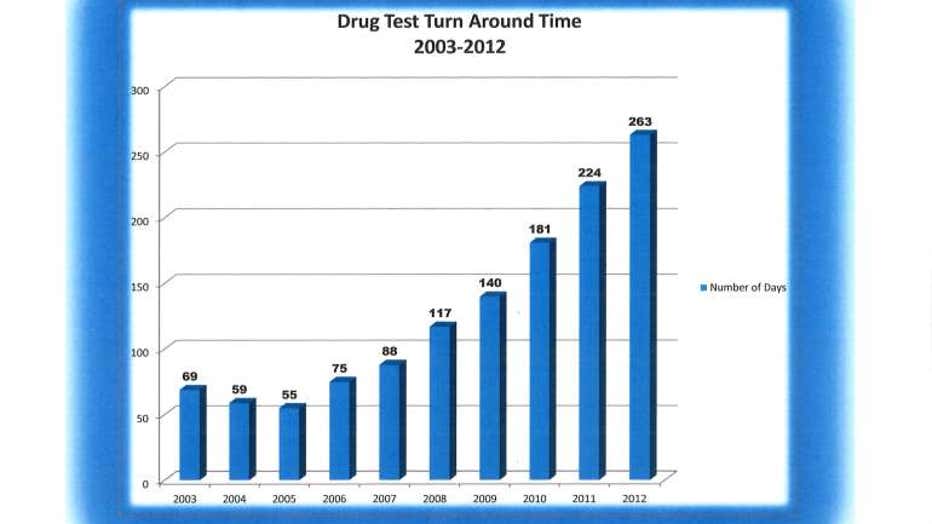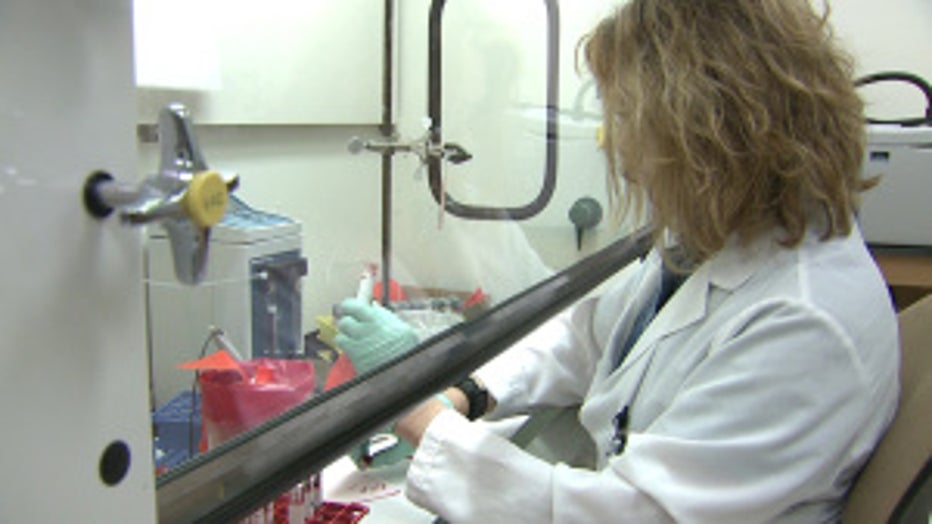Backlog at state lab leaves drug-impaired drivers on the road
BROWN DEER (WITI) -- It's no secret that Wisconsin has a serious problem with drunk driving. But a FOX6 Investigation finds a dramatic increase in drivers suspected of being on drugs. And that's causing a dangerous backlog in drug testing.
It could be that more drivers are getting high on pills or illegal street drugs, like heroin. Or, it could just be that cops are getting better at detecting it. Either way, the backlog in drug testing is putting justice on hold and allowing dangerous drivers to stay on the road.
It was the fourth of July, 2012.
The sun was shining and 29-year-old Heather Reise was already plowed.
"We had witnesses who reported watching her fall asleep while driving," said Sgt. Lucas Kuehne of the Brown Deer Police Department.
Reise was headed west on Brown Deer Road when she mowed down a stoplight, crossed six lanes of traffic and launched her Chevy Tahoe 40 yards into the woods. Her 2-year-old daughter was in the back seat.
"It was quite a miracle that nobody was hurt," Kuehne said.

Heather Reise launched her SUV 40 yards into the woods near 64th Street and Brown Deer Road in 2012.
He could tell right away that Reise was on something.
"She was literally leaning over and falling asleep," he said.
A preliminary breath test showed no alcohol in her system, but her boyfriend was a dead giveaway.
"The needles started falling out of his shorts," Kuehne said.
Investigators found hyperdermic needles and other drug paraphernalia in the car.
And, as Kuehne put the cuffs on Reise, she admitted to smoking crack.
Still, prosecutors in Milwaukee County decided to wait for blood tests before charging her with a crime.
The results would not come back for another 214 days.
"We do acknowledge, have always acknowledged that the turnaround time was unacceptable," said Amy Miles, Director of Forensic Toxicology at the University of Wisconsin State Laboratory of Hygiene. The hygiene lab tests more than 20-thousand blood samples each year from drivers suspected of operating while intoxicated.
"Our turnaround time for alcohol is usually about 3 days," Miles said.
Testing for alcohol is easy, she says. Testing for drugs is much more complex. Miles gave FOX6 a behind-the-scenes tour of the lab where blood tests are performed. And while the science is sophisticated, the problem is rather simple.
"The workload has increased, but not proportionate to the resource," Miles said.
While the number of requests for alcohol testing has declined blood tests for both street drugs and prescription pills are on the rise. In 2003, police submitted roughly 2355 blood samples for drug testing. By 2013, that number had nearly doubled to more than 4350. Meanwhile, the turn-around time for drug tests ballooned from 69 days in 2003 to 263 days in 2012.
"Like a snowball down a mountain we get further and further behind," said Brad Schimel.

Source: Data provided to FOX 6 News by the Wisconsin State Laboratory of Hygiene
He is the Waukesha County District Attorney. He is also the lone Republican candidate to replace JB Van Hollen as Attorney General. And in March, he proposed moving OWI testing away from the University's hygiene lab and placing it at the state crime lab, which is operated by the Wisconsin Department of Justice
"I think it just makes sense to move that there," Schimel said. "Let the UW system focus on educational science and hygiene. Move this over to the crime lab where we are working on public safety."
Miles says it doesn't matter where the lab is located, forensic testing is the same.
"We are the specialists in that, and we are very good at it. And just because we're within the university doesn't change that."
She says the delays are caused by several factors.
"There's a lot more sample preparation . There's a lot more steps that have to happen."
And many drivers, like Heather Reise, take more than one drug at a time.
"There could be up to 9 drugs in that one person. Each of those 9 drugs requires its own procedure," Miles said.
Because of the complexity of the science, analysts are often called upon to testify in court.
"We testify in OWI cases over 300 times a year, so you can imagine that's a pretty significant impact on our workload," Miles said.
"There haven't been resources put into this effort to keep up with demand," Schimel said.
Schimel's potential opponents on the Democrat side agree that the delays are a concern.
State Asseblyman Jon Richards says the delays are "unacceptable" and that it's worth considering a move to the crime lab. But Jefferson County District Attorney Susan Happ says that's not the problem.
"We need to look at providing more resources for the hygiene lab," Happ said.
Dane County District Attorney Ismael Ozanne agrees that staffing is a problem.

The hygiene lab recently added two new analysts to the forensic toxicology unit to help with the backlog in drug testing.
"We need to have adequate staffing in the hygiene lab and the crime lab," he said.
Miles says they're actually fully staffed now, thanks to two recent additions. And they're making changes in the way they test for drugs that should speed up the process. For instance, in about 25-percent of the cases, they now stop testing as soon as the first drug is identified. Miles says that's usually enough for prosecutors to get a conviction.
"We're always trying to make sure we're being as efficient as we can."
She says the changes are already having an impact.
"For THC testing we're at about a month. For everything else, we're about 4 months to 6 months."
"We are seeing some better turn around," Schimel says. "It is still too long."
In May of last year, Heather Reise was picked up for driving on drugs again. This time in Cudahy. The arresting officer wrote that her "behavior was odd." She had a "blank expression" and "couldn't remember things she just said."

Drug testing delays allowed Heather Reise to go 10 months without court supervision. During that time, she got arrested for driving on drugs again.
But Reise did remember one thing. She told the officer she had two prior OWI's, even though Department of Transportation records showed just one. Reise's recollection was correct. It's just that, even though ten months had passed since the crash in Brown Deer, prosecutors had yet to charge her with anything. Instead, she was still driving with a brain that was "fried from drugs." Those are her words.
"That's ten or twelve months with that person not under any kind of supervision," Schimel said. "And no one has done anything to intervene in their problem."
And that is how a backlog at a lab could be putting you and your family in harm's way.
"Are we going to wait on one of these people kill somebody?" Schimel asks. "We better not."
In March, Heather Reise was convicted of second degree recklessly endangering safety for the crash that occurred in Brown Deer two years ago. She's serving 20 months in prison. Meanwhile, she was just charged last month for the arrest in Cudahy from 2013. In that case, it took another 331 days for the hygiene lab to return the test results, which came back positive for cocaine, as well as painkillers and muscle relaxers.
Schimel says the crime lab has proven it can deliver faster turnaround times. He also says that it makes more sense to house drug tests in a law enforcement environment setting rather than an educational one.
Amy Miles, director of the toxicology unit at hygiene lab, counters that being housed at the university allows them to maintain impartiality between the prosecution and defense. And it gives them access to the latest research on testing methods.
One thing everyone seems to agree on is that drug testing needs to happen more quickly.

